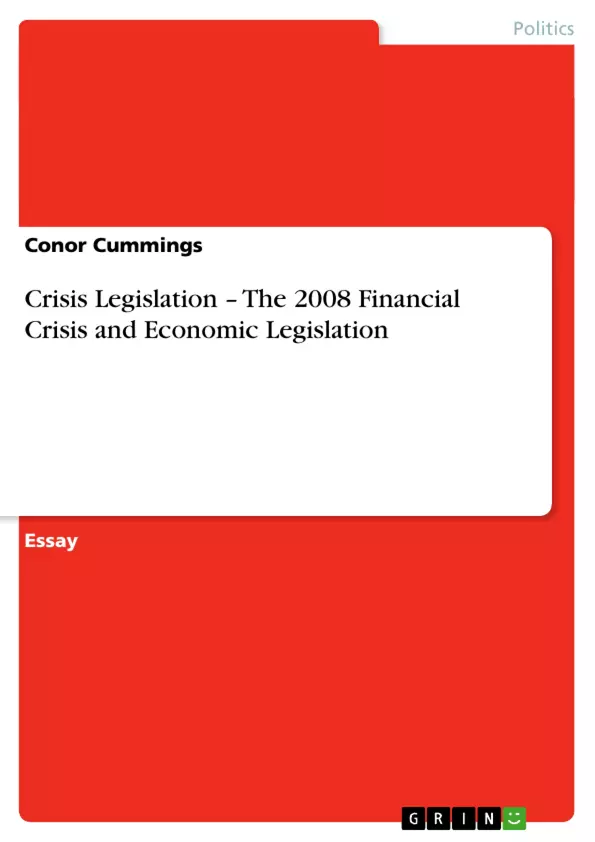The 2008 Financial Crisis and subsequent economic recession made economic legislation a priority for newly-elected President Barack Obama. The American Recovery and Reinvestment Act of 2009, better known as 'The Stimulus,' provided a case study in the domestic politics of 'crisis' legislation.
Inhaltsverzeichnis (Table of Contents)
- Crisis Legislation
- Obama and the Stimulus Bill
- A Time of Crisis
- Hamiltonian Energy in the Executive
- The Partisan Nature of the Stimulus
- Obama's Popularity and the Success of the Stimulus
- The Potential Dangers of the Stimulus
Zielsetzung und Themenschwerpunkte (Objectives and Key Themes)
This text examines the passage of the American Recovery and Reinvestment Act of 2009, focusing on the role of President Barack Obama and the political dynamics that facilitated its enactment. The key themes explored include:- The impact of the 2008 economic crisis on American politics
- The interplay between executive authority and legislative action
- The role of political parties in shaping economic policy
- The effectiveness of stimulus measures in addressing economic downturns
- The potential long-term consequences of government intervention in the economy
Zusammenfassung der Kapitel (Chapter Summaries)
This section focuses on summarizing the main arguments and themes of each chapter, excluding any content from the conclusion or final chapter to avoid spoilers.- Chapter 1: This chapter establishes the context for the stimulus bill by discussing the economic crisis of 2008 and the resulting political climate. It highlights how the crisis led to a one-issue election focused on the economy and how President-elect Obama used his electoral success to advocate for a stimulus package.
- Chapter 2: This chapter explores the relationship between executive power and legislative action, referencing Alexander Hamilton's arguments for a strong executive in Federalist No. 70. It examines how Obama's energetic approach and the political landscape created by the crisis helped secure the passage of the stimulus bill.
- Chapter 3: This chapter delves into the partisan nature of the stimulus bill, highlighting the role of the Democratic majority in Congress and the potential influence of political motivations behind the legislation. It explores critiques of the bill's effectiveness in stimulating the economy and its reliance on short-term redistributive measures.
- Chapter 4: This chapter investigates the connection between Obama's popularity and the success of the stimulus bill. It examines how Obama's electoral mandate and the Democratic party's response contributed to the swift passage of the legislation.
- Chapter 5: This chapter considers potential long-term consequences of the stimulus bill, raising concerns about its potential to foster a culture of lobbying and interest group politics, ultimately leading to government expansion and increased deficits.
Schlüsselwörter (Keywords)
The core concepts and terms explored in this text include: economic crisis, stimulus bill, executive authority, legislative action, political parties, economic policy, redistributive measures, lobbying, interest group politics, government intervention, long-term consequences, and American Recovery and Reinvestment Act of 2009.Frequently Asked Questions
What was the American Recovery and Reinvestment Act of 2009?
Commonly known as 'The Stimulus,' it was a massive economic recovery package signed into law by President Obama to combat the effects of the 2008 financial crisis.
How did the 2008 financial crisis influence the US election?
The crisis turned the 2008 election into a 'one-issue' campaign focused on the economy, which allowed Barack Obama to build a strong mandate for rapid legislative action.
What is 'Hamiltonian Energy' in the context of the Stimulus Bill?
It refers to Alexander Hamilton's concept of a strong, energetic executive. Obama used this authority to push the stimulus through Congress quickly during a time of national emergency.
Why was the Stimulus Bill considered partisan?
The bill was passed largely by the Democratic majority in Congress with very little Republican support, leading to critiques that it favored political interests over purely economic ones.
What were the potential long-term dangers of the stimulus?
Critics raised concerns about government expansion, increased national deficits, and the risk of fostering a culture of lobbying and interest group politics.
- Arbeit zitieren
- Conor Cummings (Autor:in), 2009, Crisis Legislation – The 2008 Financial Crisis and Economic Legislation, München, GRIN Verlag, https://www.grin.com/document/210761



